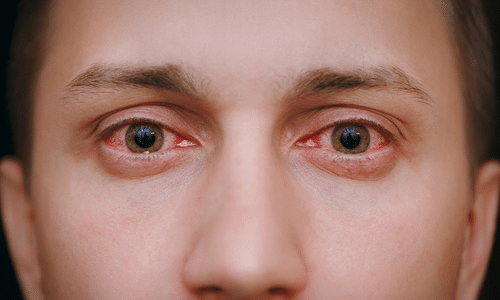Symptoms, Causes, and Treatments of an Eye Cold
-
Created in
Newsletters

Do You Have an Eye Cold?
Colds and other viral infections don’t just cause sneezing and coughing but they may also affect your eyes. If your eyes are red, uncomfortable, and won’t stop watering, an eye cold may be to blame.
What is an Eye Cold?
An eye cold occurs when you have viral conjunctivitis, commonly called “pink eye.” Viruses affect mucous membranes in your body, including those in the eyes, lungs, and nose.
Viral conjunctivitis is highly contagious and can be spread by person-to-person contact or by touching an object contaminated by the virus. If someone coughs near you or shakes your hand after wiping their eyes, you may catch an eye cold. If you already have a cold, it may spread to your eyes if you cough or sneeze into your hand then rub your eyes.
Although viral conjunctivitis isn’t a serious eye infection, you might need to stay home from school or work to prevent the virus from infecting other people.
What Are the Symptoms of Viral Conjunctivitis?
If you have viral conjunctivitis, you may develop one or more of these signs and symptoms:
- The Whites of Your Eyes Look Pink or Red
- Watery Eyes
- Discharge
- Itching and Burning
- Blurry Vision
- Sensitivity to Light
- Eyelid Swelling
- A Feeling That Something Is Stuck in Your Eye
These symptoms may also occur if you have allergic or bacterial conjunctivitis. If you’ve haven’t been sick but have allergies, your eye discomfort may be related to your allergies.
Bacterial conjunctivitis can occur if your eye comes in contact with bacteria. You can develop this form of conjunctivitis if you don’t wash your hands before touching your eyes, fail to clean your contact lenses properly, or use contaminated makeup or personal care products.
How Can I Treat an Eye Cold at Home?
Viruses usually go away on their own within a week or two. While you wait to get better, these steps can help improve your comfort:
- Create a Soothing Compress. Wet a washcloth with warm water, wring it out, and place it over your eyes. Warm washcloths can be particularly helpful if discharge glues your eyes together when you wake up in the mornings. After the compress remains on your eyes for 10 to 15 minutes, you should be able to gently pry your eyelashes apart.
- Use Artificial Tears. Artificial tears lubricate your eyes and relieve burning, itching, and grittiness.
- Take Over-the-Counter Pain Relievers. The medication may help reduce pain, inflammation, and fever.
- Get Plenty of Rest. Rest is an important aspect of your recovery. Even if you don’t feel ill, it’s a good idea to devote more time to rest.
Washing your hands frequently, particularly if you’ve accidentally touched your eyes, will help prevent the virus from infecting other people in your home. Wash towels, washcloths, and pillowcases in hot water every day. If only one eye is infected, use a separate washcloth and towel to prevent the virus from infecting your other eye.
It’s also important to throw away eye makeup, contact lens solutions, and contact lenses (unless you wear daily contact lenses). If you continue to use the products, you may reinfect yourself.
When Should I Visit the Optometrist?
Call your eye doctor if you have trouble seeing, your symptoms aren’t improving after a week, you have a green or yellow discharge, or you have severe pain when you look at bright lights.
Your optometrist can determine if your symptoms are caused by viral conjunctivitis or another type of conjunctivitis. Although antibiotic eye drops won’t help viral conjunctivitis, they may be prescribed if you have bacterial conjunctivitis. Drops that relieve allergy symptoms may be recommended if your symptoms are actually caused by allergies instead of a virus.
Are you experiencing any of the symptoms of conjunctivitis? Contact our office to schedule an appointment.
Sources:
American Academy of Ophthalmology: Quick Home Remedies for Pink Eye, 3/27/19
